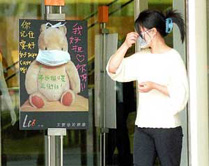 Many famous scholars and writers living in Beijing have taken on the responsibility of helping the public mentally adjust as the capital tries to fight severe acute respiratory syndrome (SARS).
Many famous scholars and writers living in Beijing have taken on the responsibility of helping the public mentally adjust as the capital tries to fight severe acute respiratory syndrome (SARS).
Bi Shumin, an author who worked as a medical doctor for 20 years and has a doctorate in psychology from Beijing Normal University, has shared her professional opinions with the public, especially those who are panic-stricken.
"The most important thing is to take a scientific point of view towards the epidemic," she told the local news media. "The battle between humans and viruses has been waged throughout the whole of human history and probably will continue for eternity.
"There is nothing so abnormally macabre in this SARS menace."
The 51-year-old writer - whose novels often deal with people's mental state when confronting illness, death and crisis - suggests that anyone choked by panic do a psychological self-analysis to find out the specific cause of his or her apprehension.
"Once the specific object of one's fear is defined, there will be a much greater chance for him or her to be reasoned into relaxation. An unidentified phobia will be poisonous to both the individual and society."
Just what is the impact of SARS on society?
From varied perspectives, different writers said they believe the calamity will turn out to be a profitable trial for the Chinese nation.
Writer Lu Tianming predicted that the crisis will help temper a strong Chinese character and strengthen the cohesion and unity among Chinese people.
The author of three best-selling novels about corruption, Lu said: "The dedication and self-sacrificing spirit of those ordinary doctors and nurses are arousing noble emulation around the whole of China."
All the writers have expressed their deep regard for the medical workers when talking about the battle against SARS.
Shi Tiesheng, who has won respect and popularity from readers for his tenacity in fighting his own handicap and illness, said: "The most concentrated public focus at the moment should be on the medical teams in combat at the front. The reasoning of writers appears pale and trivial compared with them."
However, Shi, who has been confined in a wheelchair by paralyzed lower limbs for 31 years, granted a very rare interview to the Beijing Morning News, making clear he wanted to "say something only about SARS."
He appealed to local residents to observe three rules to help pull the nation through the present difficulties: Keep calm in your personal behavior, consider the public interest, and respect and understand medical staff.
The writer has himself developed an easy, untroubled and even humourous attitude towards his own severe illness. He has had dialysis treatment three times a week for five years due to uraemia.
He uses his writing to inspire other disabled or sick people not to be daunted by life's ugly moments.
For those who have contracted SARS, Shi will serve as a very heartening and encouraging model.
In recent years, Chinese intellectual circles have represented a persistent voice to rival the ethos of a commercial society. Some scholars and writers said they now believe SARS will wash away some of the vulgar spirit of the market age.
Chen Pingyuan, a professor of Chinese literature at Peking University, called for the containment of the narrow-minded self-satisfied psychology that has prevailed in Chinese society in recent years, especially among young people who have never known any tribulations.
"The smug, complacent public mind is very harmful in the face of real ordeals," Chen said. "That is why so many people so easily surrendered to the panic produced by SARS.
"On the other hand, only when well aware of the existence of latent threats, which are indeed parts of the normal existence of human beings, can people appreciate life more profoundly and treasure life more dearly," he wrote in the Beijing press.
After the scourge of SARS ebbs, Chinese people will again be able to cherish the ancient Chinese adage: Shengyu youhuan, siyu anle, which means: Alarm in hard times makes one live; indulgence in comfort makes one die. As a result, people will be more mentally prepared to face adversity, Chen added.
Moreover, some writers have suggested that such extreme occurrences as the SARS outbreak put a check on the repetitive daily lives of people who blindly rush around in pursuit of material things. Such events give them the opportunity to stop, scrutinize how they live and recognize life's real meaning and values.
Bi Shuming said she learnt to treasure her life and decided to make it meaningful during the 11 years of her youth spent in the extremely forbidding environment of the Ngari area of the Tibet Plateau.
She said: "At least crises make people stop their busy lives and compel them to muse over the real meaning of life."
Many writers have advised people to use this period of relatively disengaged time when social activity is reduced to read some books on the humanities.
Chen Pingyuan said: "For a long time, reading in the whole of our society, including educational institutions, has almost been restricted to utilitarian knowledge or light entertainment. But it is history, literature and philosophy that really help cultivate a healthy character and psychology."
Shi Tiesheng pointed out: "Reading helps relieve the fear and anxiety. Through history and literature, you will find out you are not alone in the perpetual struggle of humankind."
(China Daily May 14, 2003)
|

